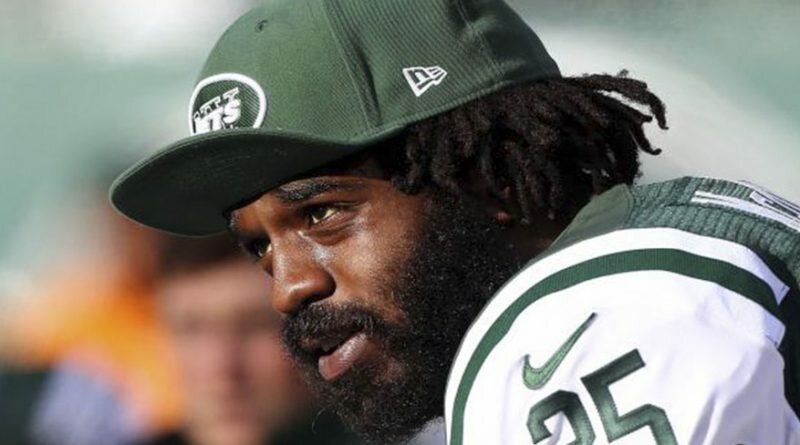Joe McKnight’s Killer Released Without Charge
“The only thing we know right now – everything else is conjecture – is that Mr. Gasser did in fact shoot Joe McKnight,” Jefferson parish sheriff said in a statement.
Ronald Gasser, the man authorities say shot and killed former NFL player Joe McKnight outside New Orleans, was released from custody overnight without being charged, according to the Jefferson Parish Sheriff’s Office, The Root states.
McKnight was shot and killed Thursday at the intersection of Behrman Highway and Holmes Boulevard in the New Orleans suburb of Terrytown, La. An eyewitness says she saw a man, authorities have identified as Gasser, yelling at McKnight, while the former football player was apologizing for something. The man shot McKnight several times as he yelled, “I told you don’t you [f–k] with me.”
Police say that when they arrived on the scene, the man, Gasser, 54, was there and handed officers his gun. McKnight had not been armed, authorities say.
The Jefferson Parish Sheriff’s Office says there are elements of the story that need to be investigated before Gasser can be charged. The investigators say the case is open and that a grand jury or district attorney will decide the charges.
Gasser, 54, has not been formally charged, said JPSO spokesman Col. John Fortunato. Investigators are consulting with the district attorney’s office on the decision whether to formally charge Gasser, Fortunato said, according to NOLA.
As the investigation into McKnight’s death continues, Fortunato asked anyone with information about the shooting to contact department homicide detectives at 504-364-5393.
⚡️ “Joe McKnight’s alleged murderer released from custody”. #EvoproSports https://t.co/bpCiRboTL4
— Evolution Project (@EV0PR0) December 3, 2016
Normand said at a news conference on Friday that Gasser fired three rounds through an open window. He said all three rounds struck McKnight, who was standing outside Gasser’s car, The Guardian reports. Joe McKnight was struck in the chest, right shoulder and left hand.
But police declined to bring charges. Asked why Gasser was released, Normand said that in Louisiana there were some “relative statutes that provide defenses to certain crimes.” He continued: “The easiest thing for me would have been [to say] ‘Book ‘em, Danno’. But the fact of the matter is in trying to flesh out these details. We chose not to do that.”
Joe McKnight is the second former NFL player this year to die in New Orleans in incidents linked to road rage. Former Saints player Will Smith was killed in April in a shooting that was sparked over a traffic altercation.
Police confirmed Gasser handed a semi-automatic handgun to officers who arrived at the scene of the shooting. Normand said witnesses saw a “heated verbal exchange” between Gasser and McKnight beforehand.
Normand said there were no indications the shooting was a hate crime. “Everyone wants to make this about race,” he said. “This is not about race.”
Joe McKnight’s killer, Ronald Gasser, released from custody https://t.co/4hcgYtM9Z1
— hobby action figure (@IDactionfigure) December 3, 2016
He said the investigation into McKnight’s death would be thorough. “We will leave no stone unturned. We’ve had as many as 30 to 40 officers working this investigation through the night.”
A unnamed witness told the Times-Picayune she saw a man shouting at McKnight, who was trying to apologize. The man shot McKnight more than once, the witness said.
But Sheriff Normand disputed that claim and said Gasser had fired from inside his car, a blue Infiniti sedan. “I strongly suggest you stop believing what you’re reading,” he said at the news conference.
Local NAACP officials said they were planning a peaceful demonstration against McKnight’s killing. “We think a black man was lynched yesterday,” Morris Reed, the president of the New Orleans branch of the organisation, said. “We are demanding some answers.”
Barbara Franklin, McKnight’s grandmother, told the Associated Press that relatives are “trying to find out our own selves” more about what happened. “He might be released now, but God is going to bring about justice in it,” Franklin said of Gasser’s release.
Antonio Cromartie, who played with McKnight for the Jets, tweeted: “I don’t get it. How in hell do you release someone who killed my brother, my friend a father a son a brother without charging him. Bullcrap.”
McKnight, a New Orleans native who went on to a decorated collegiate career at USC, was chosen by the New York Jets in the fourth round of the 2010 NFL draft.
did yall see that explanation from the chief on why they released Joe McKnight’s killer? wow!
— tea18 (~~ ham.) (@tea18) December 2, 2016
He played three seasons with the Jets, followed by a one-year stint with the Kansas City Chiefs and brief comeback attempts with the Edmonton Eskimos and Saskatchewan Roughriders of the Canadian Football League.
“We send our deepest sympathies to Joe’s family, friends, and all those impacted by this tragedy,” Roughriders general manager and coach Chris Jones said on Thursday. Reggie Bush, who played with McKnight at USC, offered his condolences on Twitter, “RIP my brother Joe McKnight,” he wrote. “This one hurts bad.”
The Jets posted a photo of Joe McKnight with the words “Joe McKnight 1988-2016” on their official Twitter account. “Rest in peace, Joe McKnight,” the team said. “Our thoughts and condolences are with his loved ones.”
“For a life to be lost so senselessly is just beyond description,” said JT Curtis, McKnight’s high school coach. “Right now it’s pretty devastating.”
“He was just a good kid,” the coach added.
The popularity didn’t protect Joe McKnight from being murdered, neither did it help to punish his killer. The justice system easily lets a white man go but the same would never happen to an African-American. We hope that the fans would not let this case be forgotten and will enforce the justice.






